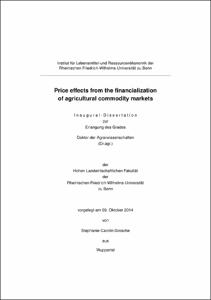Grosche, Stephanie-Carolin: Price effects from the financialization of agricultural commodity markets. - Bonn, 2015. - Dissertation, Rheinische Friedrich-Wilhelms-Universität Bonn.
Online-Ausgabe in bonndoc: https://nbn-resolving.org/urn:nbn:de:hbz:5n-39743
Online-Ausgabe in bonndoc: https://nbn-resolving.org/urn:nbn:de:hbz:5n-39743
@phdthesis{handle:20.500.11811/6236,
urn: https://nbn-resolving.org/urn:nbn:de:hbz:5n-39743,
author = {{Stephanie-Carolin Grosche}},
title = {Price effects from the financialization of agricultural commodity markets},
school = {Rheinische Friedrich-Wilhelms-Universität Bonn},
year = 2015,
month = may,
note = {Supposed portfolio benefits of commodities and the increased availability of commodity linked investment products such as index funds contribute to a financialization of agricultural commodity markets. The parallel increase in price levels and short-term volatility for almost all major agricultural commodities and a growth in trading volume on their derivative markets triggered a debate about the underlying causal linkage. In particular, financial “index trading”, i.e. taking long positions in the futures markets and rolling these forward, has been suspected to inflate prices above fundamentally justifiable levels by creating artificial demand on the futures markets.
The objective of this thesis is to investigate the price effects from the financialization of agricultural commodity markets, specifically focusing on (i) the robustness and interpretability of findings from previous empirical studies on direct price effects of index trading; (ii) volatility linkages between agricultural commodity and financial asset markets as a result of financial portfolio strategies; and (iii) direct price level or volatility effects on single agricultural commodity markets from portfolio inclusion of commodity index funds.
The thesis employs various methodologies, using a combination of a literature review with a theoretical assessment of the findings, an empirical calculation of rolling volatility spillover indices and a simulation-based Heterogeneous Agent Model (HAM). This implies a transfer of methodological knowledge from traditional financial market research to the area of agricultural economics.
Results show that the existing empirical evidence based on Granger-Causality tests between index trading activity and price levels, returns, volatilities or spreads in agricultural commodity markets does not permit conclusions on the presence or absence of a true underlying causal influence. Any definite conclusions based on these findings on index trading inflating price levels on agricultural commodity markets are likely premature. In fact, the HAM simulation reveals that index trading volume, despite being of a large magnitude and always net long, does not automatically inflate price levels. But, it may indeed transmit information shocks to the single agricultural markets and thus increase price volatility. And, the volatility spillover indices point to a stronger integration between agricultural and financial markets and an increase in volatility linkages after agricultural commodity markets have become more financialized.
Thus, the financialization of agricultural commodity markets can lead to events in other asset markets that have little or no real economic connection to agricultural commodity markets affecting the latter's price volatility, if commodity index funds are included in financial portfolio strategies. Especially in times of financial crises, these effects could be of substantial magnitude.},
url = {https://hdl.handle.net/20.500.11811/6236}
}
urn: https://nbn-resolving.org/urn:nbn:de:hbz:5n-39743,
author = {{Stephanie-Carolin Grosche}},
title = {Price effects from the financialization of agricultural commodity markets},
school = {Rheinische Friedrich-Wilhelms-Universität Bonn},
year = 2015,
month = may,
note = {Supposed portfolio benefits of commodities and the increased availability of commodity linked investment products such as index funds contribute to a financialization of agricultural commodity markets. The parallel increase in price levels and short-term volatility for almost all major agricultural commodities and a growth in trading volume on their derivative markets triggered a debate about the underlying causal linkage. In particular, financial “index trading”, i.e. taking long positions in the futures markets and rolling these forward, has been suspected to inflate prices above fundamentally justifiable levels by creating artificial demand on the futures markets.
The objective of this thesis is to investigate the price effects from the financialization of agricultural commodity markets, specifically focusing on (i) the robustness and interpretability of findings from previous empirical studies on direct price effects of index trading; (ii) volatility linkages between agricultural commodity and financial asset markets as a result of financial portfolio strategies; and (iii) direct price level or volatility effects on single agricultural commodity markets from portfolio inclusion of commodity index funds.
The thesis employs various methodologies, using a combination of a literature review with a theoretical assessment of the findings, an empirical calculation of rolling volatility spillover indices and a simulation-based Heterogeneous Agent Model (HAM). This implies a transfer of methodological knowledge from traditional financial market research to the area of agricultural economics.
Results show that the existing empirical evidence based on Granger-Causality tests between index trading activity and price levels, returns, volatilities or spreads in agricultural commodity markets does not permit conclusions on the presence or absence of a true underlying causal influence. Any definite conclusions based on these findings on index trading inflating price levels on agricultural commodity markets are likely premature. In fact, the HAM simulation reveals that index trading volume, despite being of a large magnitude and always net long, does not automatically inflate price levels. But, it may indeed transmit information shocks to the single agricultural markets and thus increase price volatility. And, the volatility spillover indices point to a stronger integration between agricultural and financial markets and an increase in volatility linkages after agricultural commodity markets have become more financialized.
Thus, the financialization of agricultural commodity markets can lead to events in other asset markets that have little or no real economic connection to agricultural commodity markets affecting the latter's price volatility, if commodity index funds are included in financial portfolio strategies. Especially in times of financial crises, these effects could be of substantial magnitude.},
url = {https://hdl.handle.net/20.500.11811/6236}
}






